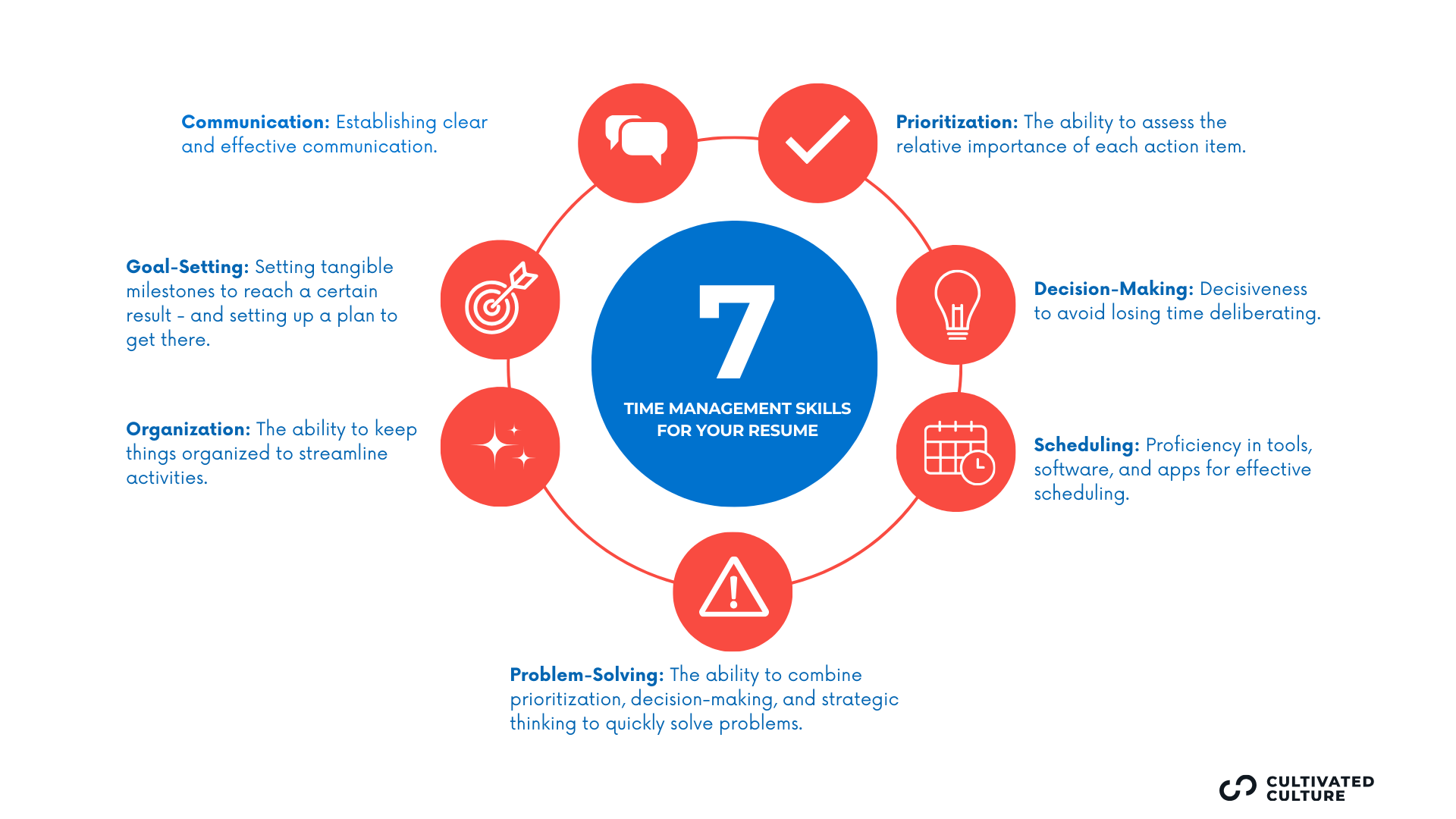“It’s really clear that the most precious resource we all have is time.”
– Steve Jobs
It’s hard to argue with the legendary Steve Jobs’ claim above.
Every activity, from the most mundane task to the grandest undertaking, requires a certain amount of time to perform. But in today’s fast-paced society, time has become a resource that many feel they are in short supply of — especially at work.
With frequent meeting schedules, heavy workloads, and countless emails coming in, it’s easy to fall behind or off track. That’s where time management skills come into play — and they can have a powerful effect on your professional life.
In this article, we’ll cover why (and how) you should be incorporating time management skills into your career or your job search.
- If you want, you can jump right into the sections of your interest:
The Importance Of Time Management
Examples Of Time Management Skills
Highlighting Time Management Skills On Your Resume
How To Describe Time Management Skills During An Interview
How To Improve Your Time Management Skills To Succeed At Work
Productivity & Resume Tips Continued
Let’s not waste another second!
The Importance Of Time Management
In the age of multitasking, time management has become an essential skill set to stay organized, efficient, productive, and effective.
When it comes to our careers, time is a precious commodity that should be managed in the most effective way possible. This means setting priorities, organizing our time, and focusing on the most important tasks at hand.
Several benefits come with honing your time management skills, both in your professional and personal life.
Here are some of the immediate, concrete benefits that can be reaped with savvy time management:
☑️ You’ll Be More Focused
When you manage your time well, you’ll always know which task/project to direct your attention toward at any given moment. Your mind won’t be scattered by all the other things on your to-do list.
☑️ You’ll Work More Efficiently
With the increased focus/clarity described above, you’ll be able to power through action items without getting distracted. Time management can help you get more done in less time, freeing up your schedule for other tasks or leisure activities. Who doesn't want to be more productive?!!
☑️ You’ll Stay Organized And On Track
One of the greatest benefits of time management is that it can help you stay organized and on track. When you’re properly organized, you’re able to keep appointments, hit deadlines, and maintain tight turnaround times. Successful time management involves proactive planning and systematic scheduling. This is important in both your professional and personal life.
☑️ You’ll Feel Less Stressed
When you’re juggling many things at once, it’s easy to become overwhelmed. Honing your time management skills will help bring structure to the chaos, which in turn can help put your mind at ease. By keeping your workflow organized and avoiding procrastination, you can minimize the amount of stress in your life. Time management skills can help you proactively avoid stressful situations (or mitigate their effects). When you have a plan and you’re organized, it can help reduce stress and anxiety.
☑️ Your Work/Life Balance Will Improve
By learning to better manage your time, you can achieve a better work/life balance and avoid burnout. To make the most of our time, we need to be good at managing it. Time management skills can help us be more focused, work more efficiently, stay organized and on track, feel less stressed, and ultimately a better balance between your career and home life.
☑️ You'll Have A Greater Sense Of Control
When you’re in control of your time, you have a greater sense of control over your life. This can lead to increased confidence and a better overall outlook. Time management skills give you the power to take control of your life and shape it the way you want.
In short, time management skills are essential for anyone who wants to be successful in their career. And
Now that we’ve explored the benefits, let’s take a look at some specific skills that fall under the umbrella of “time management.”
Examples Of Time Management Skills
Time management is not a singular activity. Rather, it’s a collection of habits and processes that fit together as a cohesive whole.
These are the 7 most important time management skills to master:
1. Prioritization
In order to allocate your time appropriately, you need to assess the relative importance of each action item on your list. Doing so will help you establish a ‘task hierarchy,’ which can then guide your activity scheduling.
2. Decision-Making
Sometimes, it’s very clear which of your tasks are high-priority and need to take precedence. But often, your action items may appear to carry similar levels of importance. In such cases, you’ll need to be decisive — otherwise, you’ll lose time deliberating.
3. Scheduling
A clearly-defined schedule is the cornerstone of successful time management. Fortunately, technology has equipped us with a wide array of apps and software to aid our scheduling and appointment setting efforts.
4. Problem-Solving
If you’re a busy person, you’ve definitely encountered this problem before: schedule conflicts. Overlapping tasks and appointments can pose a significant challenge — and you’ll need to combine prioritization, decision-making, and strategic thinking to resolve the issue.
5. Organization
Keeping things organized helps you streamline almost every activity. This goes beyond keeping a tidy desk, though. It also means organizing your digital files and folders, documenting processes and procedures, and maintaining an up-to-date calendar.
6. Goal Setting
Setting goals helps you find purpose in your work. And I don’t mean grand, bigger-than-life purposes (although, if you do find your work fulfills a purpose like such, awesome!), but tangible milestones that will help you reach a certain result.
For example, it’s one thing to be a Social Media Manager that shows up every day. It’s another thing to be a Social Media Manager aiming to grow their Instagram follower base to 50K in 6 months. Setting a goal means you’ll have to set an actionable plan to get there. And actionable plans consist of everyday to-do lists. And to-do lists make your work easier and more productive.
7. Communication
Nothing can be more time-consuming than going back and forth with a piece of information – sometimes even risking having to re-do work, which is super counterproductive! Clear and effective communication is a crucial time management skill. This includes not only thoroughness but also using the right channels and tools. For example, using project management tools like Trello, Asana, or Notion can help teams communicate effectively and save time.
So far, we’ve covered what time management entails and why it’s important. Now, let’s review how you should communicate this valuable skill on your resume…
Highlighting Time Management Skills On Your Resume
As you’ve probably gathered from above, time management is a crucial soft skill in the workplace — and employers recognize this.
So, if having time management skills is one of your strengths, you should certainly strive to showcase that on your resume.
But, how?
Here’s a general rule of thumb to help guide you: when it comes to writing your resume, it’s always better to show not tell.
In other words, you should aim to describe real-world examples of scenarios in which you applied your skills and strengths.
To illustrate this, let’s consider the two hypothetical resume examples below:
Time Management Example #1 (Weak)
-Excellent time management.
-Highly organized with strict adherence to deadlines.
-Proficient multitasker, working well under pressure.
Time Management Example #2 (Strong)
-Developed an improved workflow which cut turnaround times by 20%.
-Kept team on-schedule through 3 high-priority product launches, successfully completing all deliverables before the target deadlines.
Notice how the second example references specific, concrete accomplishments (as opposed to the generic self-promotion in the first example) through measurable results.
To help you take it up a notch, I’ve created ResyBullet.io, a free resume bullet analyzer that helps you write crazy-effective resume bullets that grab recruiters' attention.
Simply copy and paste your resume bullet below to begin your analysis and ResyBullet will not only scan and score it but show you exactly how you can improve it:
💡Pro Tip:
If you are struggling to find measurable results to add to your resume, check out our article “Resume Metrics: 5 Wayts To Add Measurable Results In Your Resume (With Examples!)“
This concept of ‘Show Not Tell’ is not limited to your resume — it’s also applicable to job interviews, which leads us to our next section…
How To Describe Time Management Skills During An Interview
Continuing on the notion above, an interview is a great opportunity to dig in and get even more specific than a one-page resume allows.
Following the ‘Show Not Tell’ principle, you should be utilizing the interview to bring up stories from your work history that clearly demonstrate your strengths (e.g. time management skills).
For example, if there was a critical moment when you exhibited time management skills in your last role, you can use that story as tangible proof of your abilities.
Often, interviewers will ask situational questions (i.e. “tell me about a time when…”), which is a perfect opportunity to dive into a compelling story.
💡Pro Tip:
The key to nailing your interview responses is preparation. If you’re preparing for an interview, be sure to review The 7 Core Interview Questions.
How To Improve Your Time Management Skills To Succeed At Work
In this article, we've emphasized the importance of time management skills and how you should be highlighting those skills on your resume (and in interviews).
But what if you feel that you're lacking in the ‘time management department'? Don’t worry — like any skill, prudent time management can be developed with diligence and effort.
Here are 4 proactive tips to help you improve your time management skills:
Tip #1. Identify the times of day you feel most productive. Maybe you’re an early bird, maybe you’re a night owl — or maybe you get a burst of energy around noon. Try to build your schedule so that your most difficult tasks align with the times you tend to feel most alert.
Tip #2. When you create a schedule or deadline, commit to it. Being flexible is often a good thing. But, when it comes to time management, some rigidity is necessary. If you’re constantly rearranging your schedule or shifting deadlines, this will undermine the effectiveness of the whole process.
Tip #3. Know your most common distractions (and avoid them). We all get distracted — it’s part of being human. But we often have certain ‘lures’ that are particularly enticing . Do you check Instagram every 20 minutes? Use an app blocker when working on an important task. Love to snack? Set a timer and forbid yourself from eating until the time is up. Removing little distractions like this will save tons of time while keeping you focused.
Tip #4: Use the Pomodoro Technique to accomplish tasks on your to-do list. This tried-and-true method, originally pioneered by Francesco Cirillo, has been adopted by individuals around the globe to increase their productivity and improve their time management skills. See below for details on how to use the Pomodoro Technique.
How To Use The Pomodoro Technique
The Pomodoro Technique can be applied in any situation that requires mental focus and a task to be completed. All you need is a timer and some self-discipline! Here’s how it’s done:
- Designate a task you want to complete.
- Set a timer to 25 minutes.
- Wholeheartedly commit to focusing on that task (with zero distractions or interruptions) for the 25-minute period.
- When the timer runs out, take a quick break and jot down a check-mark on a piece of paper.
- For the first three check-marks, allow yourself a 3-5 minute break.
- For every fourth check-mark, allow yourself a 15-30 minute break.
- Repeat until the task is finished!
Pomodoro Variations To Consider
The standard version of the Pomodoro Technique calls for 25-minute work intervals. For the average human attention span, this is a relatively ideal ratio of concentration-to-break time. However, it’s not a rigid rule — and you may find one of the following variations more suitable:
- 60 or 90-Minute Intervals. If you have a naturally strong attention span, you may be comfortable working longer than 25 minutes without a break. If so, that’s great! Try 60-minute intervals to start and 90 minutes if you’re a concentration champ!
- Flow-State Intervals. To determine a custom interval that fits you best, track the amount of time you focus on a task when you feel ‘in-the-zone.’ Then, use that timeframe as your Pomodoro Interval. To adjust the breaks accordingly, apply a 1-5 ratio for short breaks and 1-1 for long breaks.
Productivity & Resume Tips Continued
For busy professionals, optimal time management is no small feat. But, by utilizing the tips above, you'll be better-positioned for more efficient, productive workdays — which will ultimately facilitate greater success in both the short-term and the long-term!
Continuing on that note, for more productivity tips, be sure to check my articles on How To Stay Motivated At Work And Improve Productivity and How To Create a 30-60-90 Day Plan That Will Keep You Motived!
And, lastly, for more resume insights, don’t miss my complete guide on How To Write A Job-Winning Resume and What We Learned From Analyzing 125,000+ Resumes!






























